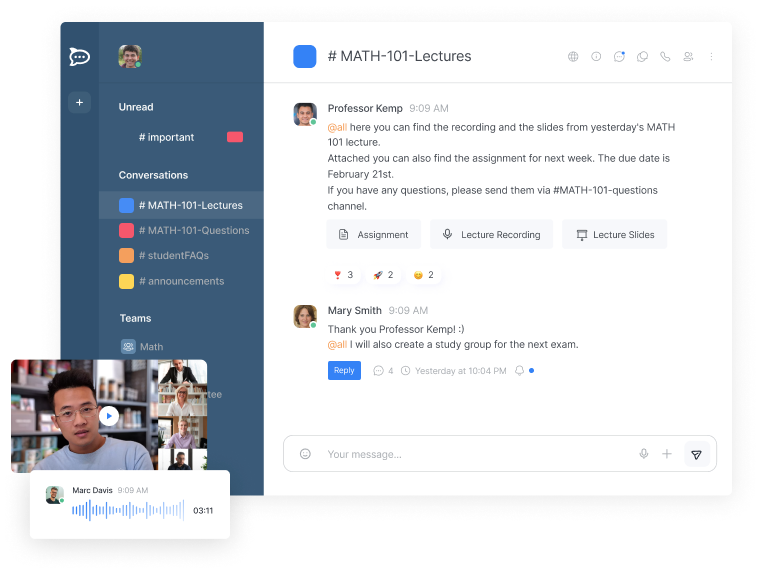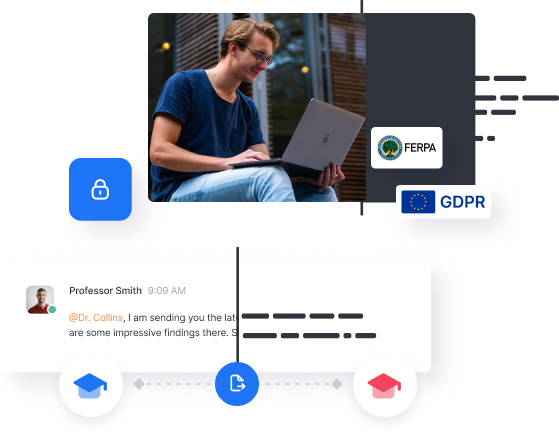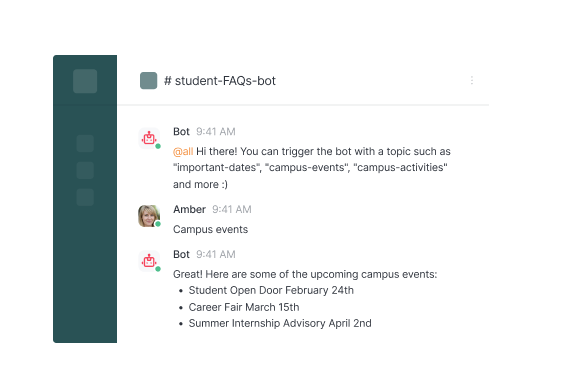Why Universities Choose Open Source Collaboration Software
Rocket.Chat is an example of how universities are choosing open source software for communication and collaboration.
Higher education institutions are actively looking for ways to adapt to rapidly improving technology and enable students to use advances in computing to study, collaborate, and learn in new ways. Many institutions have been using open source software to exchange knowledge more easily, ensure a better learning experience, and handle administration with fewer worries.
 Sara Ana ČemažarDemand for open source software in higher education is drastically increasing especially as the need for remote learning grows.
Sara Ana ČemažarDemand for open source software in higher education is drastically increasing especially as the need for remote learning grows.
Universities usually have complex and unique systems. From a technological point of view, this makes it harder for universities to adopt technologies not built with their specific requirements in mind.
Additionally, almost 70% of public sector employees believe that their digital skills are poorer than those of their private-sector colleagues, making them harder to adapt to completely new systems.
The need for high-level customization for digital tools and high data security standards are among the main reasons universities get increasingly drawn to open source solutions. Higher education institutions are also attracted to open source software due to hefty price tags and vendor lock-in from proprietary tech providers whose solutions only partly cover universities' technology needs.
6 reasons universities choose Rocket.Chat
Rocket.Chat is a prime example of how open source technology more than meets universities' increasing needs. As a highly flexible team collaboration software, Rocket.Chat has been serving security-oriented companies that want to collaborate and communicate effectively. Rocket.Chat also supports universities in providing a better study environment to their students—enabling students to easily communicate with one another, teachers, researchers, and other stakeholders.
 Rocket.Chat user interface - Sara Ana Čemažar (CC BY-SA 4.0)
Rocket.Chat user interface - Sara Ana Čemažar (CC BY-SA 4.0)
Rocket.Chat's ability to interact with other communication channels allows students, teachers, researchers, and supporting staff to communicate with other universities and organizations from a single platform.
Here are the specific ways in which Rocket.Chat helps higher education institutions:
Improve hybrid and remote learning Rocket.Chat was built to enable users to communicate. Teachers and students can set up teams, channels, and discussions to communicate synchronously and asynchronously. Students become fully engaged by enabling a fast and diverse communication medium that they can install on their laptops and smartphones.
Ensure complete data privacy and compliance With Rocket.Chat's self-deployment and on-premise options, universities have full ownership of their data. Staying compliant with regulations such as the General Data Protection Regulation (GDPR) and Family Educational Rights and Privacy Act (FERPA) doesn't ever need to be compromised.
 Open source student collaboration - Sara Ana Čemažar (CC BY-SA 4.0)
Open source student collaboration - Sara Ana Čemažar (CC BY-SA 4.0)Provide better student experience Students can ask questions, stay informed on class and project-related activities, collaborate with peers, and contribute to the class.
Custom technology Since Rocket.Chat is open source, the software can be customized according to a university's unique needs. Universities can showcase their brand and make other tweaks to adjust Rocket.Chat to their existing systems, not the other way around.
Automation Universities can leverage Rocket.Chat's live chat to answer students' questions. Or provide helpful information while they are still exploring the education programs on your website. Chatbots can be used to automate repetitive tasks, such as student onboarding, frequent FAQs, holiday announcements, and so on.
 Student FAQs - Sara Ana Čemažar (CC BY-SA 4.0)Integration capabilities To improve student experience even further, universities can integrate Rocket.Chat with the existing technologies they use—like Moodle, Big Blue Button, and more.
Student FAQs - Sara Ana Čemažar (CC BY-SA 4.0)Integration capabilities To improve student experience even further, universities can integrate Rocket.Chat with the existing technologies they use—like Moodle, Big Blue Button, and more.
Get started with Rocket.Chat
You can try the community version of Rocket.Chat by installing it on your own hardware, or instead, you can let the Rocket.Chat teams take care of the infrastructure and use their SaaS and Self-Managed service. If you have ideas or code to contribute, visit the Rocket.Chat Git repository.
- Tags:
- Big Blue Button
- class contribution
- communication channels
- Family Educational Rights and Privacy Act (FERPA)
- General Data Protection Regulation (GDPR)
- higher education institutions
- hybrid learning
- Integration capabilities
- Moodle
- oen source student collaboration
- open collaboration
- open communication
- open education
- open source software
- open source solutions
- open source technology
- peer collaboration
- project-related activities
- proprietary tech providers
- remote learning
- Rocket.Chat
- Sara Ana Čemažar
- team collaboration software
- universities
- vendor lock-in
- Login to post comments